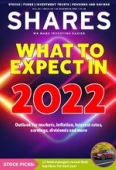Archived article
Please note that tax, investment, pension and ISA rules can change and the information and any views contained in this article may now be inaccurate.
Judging Dr Martens and Moonpig post-IPO hype

One fund manager recently told me they would never invest in a company when it first joins the market, instead preferring to wait a year or so before considering it, even if it meant losing out on 10% or 15% of gains for ones that were successful.
You often see companies list on a stock market accompanied by bold ambitions, which creates a buzz around their IPO (initial public offering). By waiting for a year before investing, this hype can die down and investors can judge a company purely on its performance.
We’re now at the stage when two high-profile IPOs have settled down to life as listed companies and have reported financial results, namely Dr Martens (DOCS) and Moonpig (MOON) which listed in early 2021.
Their shares have been quite volatile since listing although both are trading above their IPO offer price.
It is common to see the same pattern with IPOs – they shoot up in the first few weeks on the market, then fall back as initial investors bank a quick profit, upon which longer-term investors take a position and the shares go back up.
In the case of Dr Martens and Moonpig we’ve not seen much of that second leg-up, perhaps because the market seems to be fearing the end of lock-up periods involving pre-IPO shareholders.
Both companies were backed by private equity firms when they came to the stock market, and these investors were barred from selling more shares until 180 days after the IPO date, unless special permission was given. Directors and other staff were barred from selling until 365 days after listing.
We often see selling once lock-up agreements expire, such as with cyber-security group Darktrace (DARK) recently. Some of the big private equity investors in Moonpig sold a chunk of shares in August and again in October but interestingly this hasn’t happened at Dr Martens. Is it just a matter of time?
These lock-ups act as share overhangs – the market senses there will be selling and speculative investors get out before it happens, depressing the share price. You then get selling by the pre-IPO investors once the lock-up ends causing further price weakness.
Both Dr Martens and Moonpig issued results on 9 December meaning we now have a better idea if they are living up to the hype which accompanied their IPOs. Both are attractive investments – it’s just a question of whether you want to wait for the lock ups to expire before committing your money.
Dr Martens fell nearly 7% on its results amid shipping delays in the US, however the company was upbeat about the future and profit is growing. It is an attractive business making good returns.
Moonpig’s shares jumped 6% after it said annual revenue for the current year would be at the upper end of the previous guidance range. There appears to be a structural shift towards buying cards online. Gifting is also becoming a bigger contributor to its earnings, thereby diversifying its income. Customers are loyal and are spending more frequently.
While revenue couldn’t match last year’s stellar period when lockdown encouraged so many people to buy cards via their phone or laptop, strategically Moonpig is certainly living up to the hype.
Important information:
These articles are provided by Shares magazine which is published by AJ Bell Media, a part of AJ Bell. Shares is not written by AJ Bell.
Shares is provided for your general information and use and is not a personal recommendation to invest. It is not intended to be relied upon by you in making or not making any investment decisions. The investments referred to in these articles will not be suitable for all investors. If in doubt please seek appropriate independent financial advice.
Investors acting on the information in these articles do so at their own risk and AJ Bell Media and its staff do not accept liability for losses suffered by investors as a result of their investment decisions.
Issue contents
Editor's View
Feature
Great Ideas
Investment Trusts
News
- BuzzFeed IPO flops while LadBible’s listing is a success
- Market not sure about Rentokil’s $6.7 billion deal merits
- Ocado winning robot wars but UK sales have disappointed
- Could Tesco or Sainsbury’s be in the market for Boots?
- Investors eye last minute Santa Rally on the markets
- Vanguard expands LifeStrategy fund range with ESG options

 magazine
magazine








